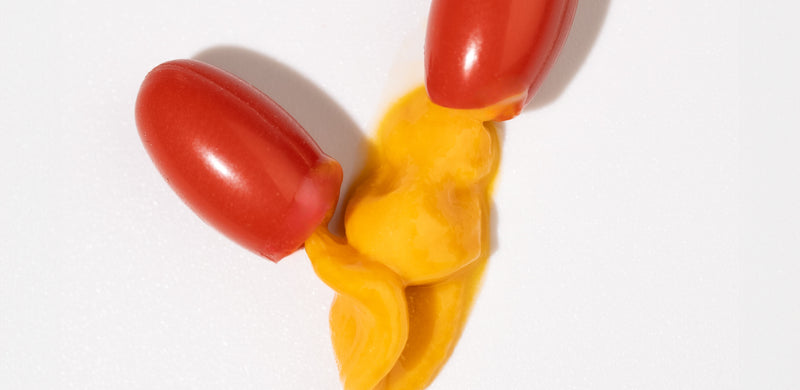Probiotics: Your Secret Weapon for Stellar Dental Hygiene
It’s kind of uncomfortable to think about, but our mouths play host to between 500 and 1,000 different types of bacteria. Many of those types are good and necessary for optimal oral hygiene. The balance of good and bad bacteria can be upset by a number of factors and circumstances, however, and this can lead to bad breath, cavities, gingivitis, and other dental conditions.
You know that taking a probiotic can help maintain a healthy balance of bacteria in your gut, but did you know that probiotics can benefit your oral health too? In the past 20 years, research has emerged that suggests the ability of certain live active culture strains to colonize in the mouth and promote higher levels of good bacteria for better oral hygiene, immunity, and overall health.

Same same but different
The strains that cause issues in the oral microbiome are different than the ones that contribute to digestive discomfort in the gut, and the strains that help to reestablish a healthy balance of bacteria in the mouth are not the same as the ones that promote ideal gut health either. While these beneficial strains are found naturally in the oral microbiome and can be obtained from a variety of bacteria-containing foods, consistent supplementation with oral probiotics that contain the strains may help prevent the overgrowth of bad bacteria and maintain homeostasis.
Strains that have shown promise in scientific studies include Streptococcus salivarius K12 and M18, and Lactobacillus species plantarum, casei, rhamnosus, and reuteri. How does each type of bacteria specifically benefit oral hygiene? Let’s take a look.
Streptococcus salivarius
Candida albicans is a type of yeast present in inconsequential amounts on skin, inside intestines, and in the mouth. Under normal circumstances, its growth is checked by good bacteria. If bacteria levels are disrupted, Candida overgrowth can cause a condition called oral thrush, which is characterized by white, bumpy spots on the tongue, inner cheeks, and tonsils. Overgrowth can also contribute to various infections in other areas of the body. Streptococcus salivarius strains interfere with the proliferation of Candida yeast by attaching to surfaces where the yeast would replicate, crowding it out.
S. salivarius K12 plays a role in limiting the growth of Streptococcus pyogenes, a harmful bacteria that can cause infections in the pharynx. Studies have also confirmed its ability to reduce tonsil infections, limit the reproduction of bacteria in the upper respiratory tract, and fight halitosis (the result of “the action of anaerobic bacteria that degrade salivary and food proteins to generate amino acids, which are in turn transformed into volatile sulfur compounds”6).1 Additionally, S. salivarius K12 may help to alleviate ear infections.2
S. salivarius M18 also inhibits the reproduction of S. pyogenes. It may counteract the processes that form plaque on teeth by producing enzymes that destroy another harmful bacteria strain, S. mutans.3 Studies suggest that S. salivarius M18 has potential to lower the likelihood of cavity development.4
Lactobacillus plantarum
Taking probiotics that contain L. plantarum strains can support the immune system by encouraging certain defenses against pathogens, like antigen presentation and leucocyte maintenance. These supportive mechanisms can help reduce the amount of stress on the immune system, improving its ability to protect the body from infections and illnesses.5

Lactobacillus casei and rhamnosus
Cavities, or dental caries, occur when acid demineralizes tooth enamel and decay sets in. Probiotics can prevent cavities by sticking to the surfaces that harmful bacteria would otherwise colonize on. Beneficial bacteria can also metabolize sugars to slow the production of acid. In one study, L. casei and L. rhamnosus strains were used to inhibit the growth of S. mutans and S. sobrinus, two types of Streptococcus bacteria known to contribute to the development of cavities.6
Lactobacillus reuteri
L. reuteri secretes two substances called bacteriocins that work to prevent the growth of closely related bacterial strains and the reproduction of a range of pathogens. It competes with harmful bacteria by adhering to tissues and displays anti-inflammatory effects on the intestinal barrier, limiting the release of the cytokines that aggravate cells. Studies have shown that L. reuteri can reduce the severity of gingivitis and bleeding from the gums, and may inhibit the formation of plaque by interfering with microbe replication.7
Keep your friends close...
Pretty crazy, right? The oral microbiome is a battleground! Bacteria armies are constantly duking it out in the war for the health of your mouth, teeth, and throat. No wonder good flossing and brushing habits are so important! And oral probiotics just might be the secret weapon you need to turn the tides in favor of good bacteria, cavity-free teeth, and fresh breath – permanently. As an increasing amount of research supports the benefits of active cultures for dental hygiene, more and more dentists are getting on board with oral probiotics and seeing positive results in their patients.

A well-balanced oral microbiome isn’t just good news for your smile, either. Pathogen overgrowth in the mouth can lead to serious health conditions throughout the body because the good bacteria isn’t prolific enough to destroy the bad guys upon entry. But when the good bacteria are winning the war, they can fight off invasive bacteria and prevent infection from spreading to the esophagus, respiratory tract, and gastrointestinal system. And even if you aren’t at high risk of cavities or gingivitis, oral probiotics can act as insurance that your good bacteria levels stay optimal for both oral hygiene and total-body wellness. 8
When you’re ready to try oral probiotics for yourself, Dr. Mark Burhenne recommends looking for a supplement with a high strain count, or CFU number, that contains studied bacteria strains like S. salivarius K12 and M18.8 If you’d rather skip the trial and error process, you’re already in the right place: NatureWise Oral Health Probiotics include S. salivarius strains K12 and M18, as well as L. casei, L. rhamnosus, L. plantarum, and L. reuteri! Our sugar-free, chewable probiotic tablets promote tooth and upper respiratory tract health while warding off bad breath and supporting the body’s natural defenses against germs and pathogens.* Try them today!

*These statements have not been evaluated by the FDA. These products are not intended to diagnose, treat, cure, or prevent any disease.
SOURCES
- https://pubmed.ncbi.nlm.nih.gov/22267663/
- https://pubmed.ncbi.nlm.nih.gov/26396541/
- https://www.ncbi.nlm.nih.gov/pmc/articles/PMC3681767/
- https://www.ncbi.nlm.nih.gov/pmc/articles/PMC4598214/
- https://www.ncbi.nlm.nih.gov/pmc/articles/PMC5572349/
- https://www.cda-adc.ca/jcda/vol-75/issue-8/585.pdf
- https://pubmed.ncbi.nlm.nih.gov/16878680/
- https://askthedentist.com/oral-probiotics/




